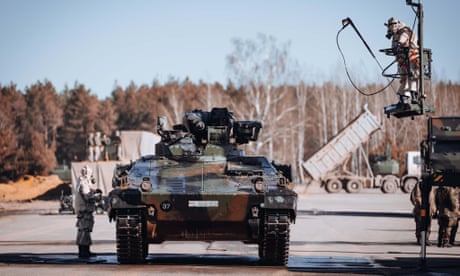- by foxnews
- 23 May 2025
Nato’s ‘achilles heel’: alliance conducts war games in nervous Lithuania
Nato’s ‘achilles heel’: alliance conducts war games in nervous Lithuania
- by theguardian
- 12 Apr 2022
- in news

About 30km west of the Belarusian border, the enemy's tanks were rolling through the pine forests of Lithuania at speed until a makeshift obstacle made of barbed wire blocked their path. Soldiers carrying bolt cutters jumped out of the armoured vehicle at the front to clear the road.
Then, a deafening bang. In its rush to victory, the advancing party had neglected to check the sandy terrain underneath the roadblock for mines. Luckily, for them, this was merely a dress rehearsal for a showdown between Russia and the North Atlantic alliance.
The western defenders may have notched up a tactical victory against an eastern aggressor on this sunny April morning, yet Nato's security architecture has never looked more fragile than in the spring of 2022, especially when viewed from Lithuania, a country long considered the alliance's achilles heel.
An independent republic since 1990, the southernmost of the three Baltic states borders both Russia-allied Belarus on its eastern side and the Russian exclave of Kaliningrad on its western flank. On Russian television, pundits have openly urged the Kremlin to escalate the war in Ukraine by enforcing a military corridor along the "Suwalki gap" - Lithuania's short border with Poland - thus cutting off the Baltics from other Nato-allied lands.
"Until last November, we had the Russian army quite far away from Nato's borders," said Gabrielius Landsbergis, Lithuania's foreign minister. "Now the military activity is very close. To add to that, Lithuania lies between the territory of Belarus and the territory of Kaliningrad. Which puts us in a strategic situation that is, let's say, interesting."
Since 2016, after Russia's annexation of Crimea, "enhanced forward presence" battlegroups have been stationed in four member states on Nato's eastern flank: Poland, Estonia, Latvia and Lithuania.
The war in Ukraine has led the alliance to further bolster its presence in the region, with multinational battalions to be dispatched to Romania, Bulgaria, Hungary and Slovakia. The military presence in Lithuania has been increased from approximately 1,200 to roughly 1,600 soldiers and equipped with new hardware, such as the German army's light and mobile Ozelot anti-aircraft system, which can be used to protect airports from aerial assaults.
But the function of these military units remains that of a "tripwire": a reminder to hardliners in the Kremlin that invading what they may see as renegade breakaway nations of a former Russian empire would automatically trigger a military conflict with other western European states. But in their current state, there is little doubt the enhanced forward presence units would sooner or later be overrun.
The scenario being rehearsed in the Rising Griffin exercise was a David v Goliath one, with the attacking force taking the role of the giant. The priority of Nato's troops in the manoeuvre, said one officer, was to "delay the enemy", not to hold the line.
As Nato members prepare to meet in Madrid in June, Lithuania, along with its Baltic neighbour Estonia, is calling on Nato to urgently adjust its posture in the region from deterrence to what it calls "forward defence".
"What we're seeing in Russia and Belarus is now a dangerous country with the intention to attack other sovereign states," Landsbergis told the Guardian. "It's a double-edged sword: on the one hand Russia has proven in Ukraine that it is a declining regional power. On the other hand, it can still do a lot of damage on its way down, as it seems to have no regard for its own losses. We have to defend the Baltic states, especially those that are geographically interesting to Russia."
In keeping with the "founding act", a political agreement signed by Nato and Russia in 1997, there are restrictions on how many western allied troops are allowed to be deployed to the Baltics, and how close they can be stationed to the border.
The enhanced forward presence in Lithuania, which is made up of seven European nations and led by Germany's Bundeswehr, has to be rotated every six months at considerable cost and effort, with hundreds of vehicles having to be transported by road, rail or air before each changeover.
While countries such as Germany and the UK remain committed to the founding act, Lithuania and other states in the region say the document is no longer viable as a treaty.
"We consider it null and void after what Russia has done," Landsbergis said. "The new reality we have to accept is that the treaties that built the old security environment with Russia are no more. We have to look at this with new eyes. There has to be a permanent military presence with everything needed to defend the skies, defend the seas and defend the land of the Baltic states."
Estonia's prime minister last week called for the three Baltic states to be handed "war-fighting capabilities", with divisions of up to 25,000 soldiers per country.
"The question we have to ask ourselves is: what will be the new global security architecture of the world after this war?" said Landsbergis. "At the moment, we are merely reacting to what is happening in Ukraine. But that has to change. We have to start thinking in strategic terms."
- by foxnews
- descember 09, 2016
United Airlines flight returns to Hawaii after concerning message found on bathroom mirror; FBI investigating
United Airlines Flight 1169 to Los Angeles returned to Hawaii after a "potential security concern" aboard the plane. The FBI and police are investigating.
read more


